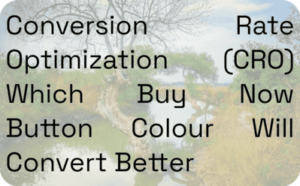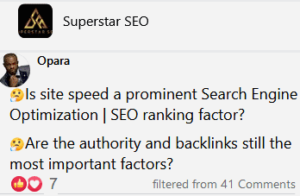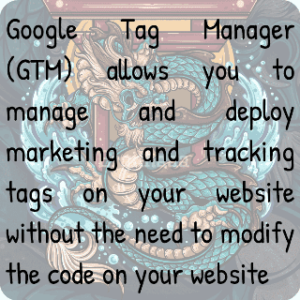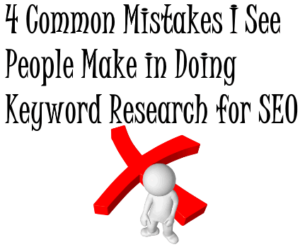Mike 🎩
Mike's Tuesday Tips:
Today isn't so much a tip as something to think about in terms of where you are devoting your time and resources.
This is probably an unpopular opinion that will probably go over like a lead balloon but here goes.
I think SEO users are full of crap when it comes to pagespeed and conversion rates.
I noticed something recently. I'm in a lot of groups and forums around the web dedicated strictly to conversion rate optimization. That's all they talk about.
You know what never gets mentioned when someone asks for help in improving their conversion rates? Pagespeed.
I do not mean rarely. I mean pretty much never. All these industry experts on conversion rates almost never bring up pagespeed. And when they do, they usually just say something like, "Keep your pages loading in under 4 seconds…"
They never quote that, "For every .5 seconds you decrease your pagespeed you will see an increase in conversions by XXX%," nonsense you see mentioned all over SEO groups and forums.
I thought maybe it was just my own confirmation bias, so I just did a search for tips for improving conversion rates. Took a look at the top 10 results.
Only 3 of them mentioned page speed.
One was Kinsta, which I hardly see as a expert on the topic. Kinsta is also probably hugely biased. They want you to believe pagespeed is vital to everything and that they offer fast hosting.
One was Hubspot, which listed it as 14th among 19 tips.
The other was VMO which is a service for A/B testing, so conversion rates are kind of in their wheelhouse. They listed it 10th out of 11 tips.
Hardly a ringing endorsement for the importance of pagespeed in conversion rates.
To me it seems it is only SEO users that believe it is so vital, and I think that is largely because they are looking to cling to anything to justify all the hours many of them are billing to clients to speed up pages. They certainly aren't seeing any benefit in the Search Engine Result Pages (SERPs).
I'm not saying it is bad to decrease load times on your site. It certainly is not going to have a negative impact on your conversions. I just think its impact on conversion rates is grossly exaggerated.
Also, before someone says it, I'm not talking about extreme examples. Yes, if your pages are currently loading in 20 seconds and you decrease that to 3 seconds or less, you will see a dramatic difference in all user metrics. I'm not debating that at all.
I'm more talking about the cases of those desperately trying to trim off an extra 0.2 seconds off of pages or push that PSI score from a 93 to a 99 or 100.
📰👈
35 👍🏽9 💟44 39 💬🗨
This comes up in Conversion Rate Optimization Junkies for sure. Not all groups ignore this 😉
It rarely comes up there and it is one of the last things mentioned.
Again though, I'm not talking about excessively slow pages. I'm talking about the people who think they are going to see a significant jump by improving their page load times from 2.6 seconds to 2.2 seconds.
Yes, if your page loads in 17 seconds and you lower it to 4, you are likely to see a noticeable difference in all user metrics across the site.
💟👍🏽3
Altman » Mike
Hope you are thinking out stress testing as well. This all plays out during traffic spikes. So the 2.6 to 2.2 will help under server load as that could turn into 15 sec vs 10 secs. Depends whats causing the bottlenecks. But, i agree that conversion wont jump if you are sub 3-4 secs and all things equal. But I have seen server issues screw conversion as traffic spikes.
Mike ✍️🎩 » Altman
Totally agree, but let's be honest. 95+% of the people stressing out about speeding up their site a little bit are not working on sites that get enough traffic to have to worry about spikes like that. 😆
Daniel
Had exactly the same thoughts yesterday and was so tired of hearing about all the effort people put into tiny ranking factors that I had to log off Facebook.
Too many people new to Search Engine Optimization (SEO) are learning from people that know about just as much. That's why there's so much hangup about things that don't really matter in the big picture. Core Web Vitals (CWV), Domain Authority (DA), duplicate content, search volumes reported by SEO tools, word count, text to html ratio, link velocity, publishing velocity etc. Etc. I just want to scream "stop overthinking it!"
To me SEO comes down to two primary areas. Writing great content and getting great backlinks. Everything else is filler. If you can do these two things right, you won't have any problems. Spend 90%, no 95% of your time learning and doing links and content.
Sorry, I got a bit carried away. That's not like me lol. Rant over
At it's most basic level, SEO is still about links pointing to a page and content on the page, and in that order.
Daniel » Mike
In my head your links are your marketing and your content is your sales but, just like traditional sales and marketing, there's a fair bit of crossover.
And as much as Google hates the backlink market,they're the bastards that created it lol
Mike ✍️🎩 » Daniel
To some degree, but with a bit of a caveat. In a competitive space, I can rank shitty content with enough good links. I can't rank good content with shitty links (not long-term anyhow).
Daniel » Mike
Yeah agreed in terms of ranking, however shitty content doesn't convert as well as great content but I suppose that diverges away from the remit if SEO slightly. I'd also add that there's plenty of money to be made in uncompetitive niches with both shitty content and shitty links so perhaps I should add niche selection as a 3rd thing to practice lol
Buth
I agree with you. Many clients of our agency (many of them from USA) require us to build site 100 score or "green zone". Then they add dozens tracking scripts and ask us "to optimize a site". Also, these persons pay for cheap hosting. The speed of website is a minor factor, so website owners should invest in content, internal linking. But they love speed because they can see "green zones", scores, seconds… Oh, people love scores.
The amount of people that get hung up on the red lights shown by SEO plugins such as Yoast is frightening. Sometimes I think people would be totally alright with screwing up their sites and rankings just to get their green light.
Buth » Daniel
👍
📰👈
Harley
Walmart broke it down in a large scale project I'm sure you're familiar with. For every 100ms increase in speed, they experienced a 2% increase in conversions, or 1% increase in revenue. I think from a CWV standpoint you're either passing or failing on each category and there are likely advantages and disadvantages to each when it comes to SEO benefit. Overall, there are probably other changes you could make to entice more conversions before you kill yourself trying to save .2 seconds of load time.
I have seen tests like these quoted many times. There was also the one about Amazon. There are very few details about how they conducted these tests though. Did they actually slow down pages? Did they ensure no other changes were done on pages, including things like new reviews posted? Why are the numbers in these tests always so exact? Did they actually change the pagespeed by 100ms increments? If so, how?
Also, if I am not mistaken, these tests were done around 2012 or so. Technology has changed a LOT since then including internet speeds and mobile devices. Back then, adding 100ms on the server side could have equated to something more like a full second on the client side.
Harley » Mike
Wouldn't it be simple enough to benchmark your pages by conversion rate, revenue over time, and load speed, then make changes and record? You're right, idk when exactly Walmart conducted its tests. I would also add, why publish company secrets? They would literally be writing the framework for how they made millions.
Daniel » Harley
I think due to economies of scale small things can make a big different for behemoths like amazon and Walmart. However its unclear how this translates to smaller websites. And as Mike said, the facts surrounding the tests are unclear as well. Who knows, maybe the website speed was increased at the beginning of the month when people have just had their paychecks lol. Or maybe a product was discontinued resulting in more purchases of an alternative product (which is one they monitoring). Enterprise level organisations are full of bureaucracy and this could have been reported and conducted by by an it manager justifying their job role or for some other political reason.
I think for most of us, getting a 90+ gtmetrix score is quite low on the list of things to expend resources and effort on when trying to improve rankings. In fact it doesn't even make my list at all lol
Harley » Daniel
Completely understandable. That's why focusing on the individual core web vitals metrics should be the issue at hand. The big G says it's a ranking factor. It makes sense to attain a passing score.
Daniel » Harley
Yes but they don't say how important a ranking factor it is – believe me, its not very important at all, almost negligible. Most of my sites are amber in cwv and outranking sites that have invested in getting a 90+ rating. To the eye, they load at the same speed, which to me is all that matters.
I guess I get a bit frustrated at all the businesses that have been fleeced by unscrupulous SEO and web dev companies that told them they would see a rankings boost after the cwv update. And the amount of time that is wasted by people focusing on little things rather than the important stuff.
Sure, if your website takes 10 seconds to load do something about it. But if its working at a comparable discernable speed to the rest of the web, don't sweat the numbers.
And whilst I'm ranting, people new to SEO get so focused on what Google say rather than what works. Google say don't buy links but this can be the quickest way to perform well in the Search Engine Result Pages (SERPs). Also, stop listening to John mu and stop reading sej lol. Right I'm done now. Sorry for ranting lol
Harley » Daniel
So your issue isn't with making websites faster. It's with companies who lie about the benefits overall. No one has measurable benefits of excellent speed for small sites. I can get on board with that.
Daniel
I would say desperately trying to meet Google's Core Web Vitals (CWV) in general is foolish. I mean if you have a dev flow and or the "know how" on how to make it happen easily then do it, but it's just 1 very small "new" 1/ 250ish factors to be sweating that hard. Page speed was always about conversions and more precisely users, User Experience (UX) factors that come from eliminating the possibility of bounces occurring due to slow load times; like, site actions and engagement, not to mention relevant traffic in general. It was all about mobile as well. Point of all this is that even if you FAIL Googles CWV, you can still actually have a site that preforms like a site that is 100 CWV. Content Delivery Network (CDN) mostly make this happen. Therefore you wont lose out on all the others factors that benefit your authority. I like also how you make the distinction with the "degree's" to which all this is the truth. If your clocking 15 seconds that's a problem, but if your around a true 2 to 3 seconds, I don't think there would be a big difference at all between that and a 1 second load time "mobile," be it all other site factors are equal. Agreed.
Verity
One of the reasons for this is people conversions is a metric that deals with people who have already landed on the page. Page speed deals with whether or not the person decides to be patient enough to even hit that page in the first place. That's why the data doesn't add up. If you consider how MANY people end up on the page… that's where you'll see page speed making a difference. Hope that makes sense.
📰👈
These may satisfy you:
» How To Improve Mobile SEO to be a Core Web Vitals (CWV) Green Score?
» CWV: Performance: 98 | Accessibility: 100 | Best Practices: 100 | SEO: 100 | Do this Strategy!








